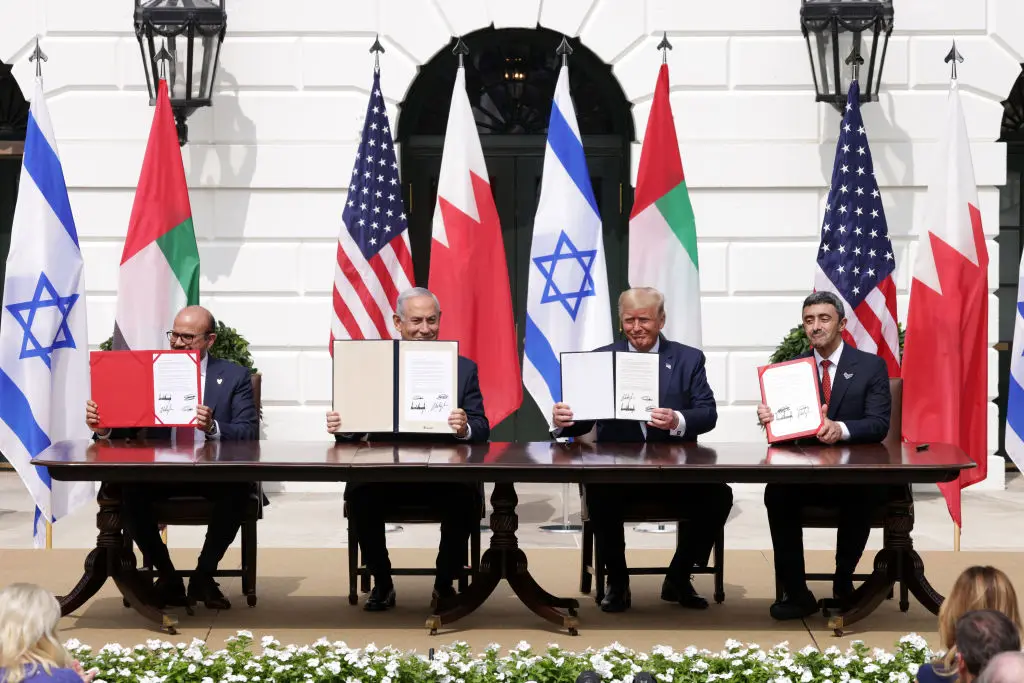Trump’s Vision for Global Peace: Abraham Accords Gain New Momentum
In a significant development for international diplomacy, President Donald Trump has announced that Kazakhstan will become the latest nation to join the Abraham Accords, marking the first such addition during his second term in office. The news signals a potential revival and expansion of the historic peace initiative that began during Trump’s first administration, aimed at normalizing relations between Israel and its Arab neighbors.
Trump shared the breakthrough on his Truth Social platform after speaking with both Israeli Prime Minister Benjamin Netanyahu and Kazakh President Kassym-Jomart Tokayev. “Kazakhstan is the first Country of my Second Term to join the Abraham Accords, the first of many,” Trump wrote, emphasizing the significance of this development. “This is a major step forward in building bridges across the World. Today, more Nations are lining up to embrace Peace and Prosperity through my Abraham Accords.” His enthusiasm reflects the administration’s renewed focus on expanding these diplomatic agreements that were first signed in 2020, creating formal ties between Israel and several Arab nations that had historically maintained distance from the Jewish state.
The momentum appears to be building rapidly, with Trump indicating that more countries may soon join the Accords. Perhaps most notably, Syria’s interim President Ahmed al-Sharaa is scheduled to meet with Trump at the White House next week, followed by a visit from Saudi Arabia’s Crown Prince Mohammed bin Salman on November 18. Saudi Arabia’s potential inclusion would represent a monumental shift in Middle Eastern geopolitics, given the kingdom’s historical stance toward Israel and its influence in the region. Such developments would significantly expand on the original Abraham Accords signatories, which included the United Arab Emirates, Bahrain, and Morocco—nations that formalized their relationships with Israel under Trump’s first term.
The expansion of the Abraham Accords represents a continuation of Trump’s foreign policy approach that prioritizes bilateral agreements and direct negotiations between parties, rather than working exclusively through traditional multilateral channels. When the Accords were first established in 2020, they marked a departure from decades of diplomatic strategy in the Middle East, which had often insisted that Israel’s conflicts with Palestinians be resolved before Arab states normalized relations. Trump’s administration challenged this conventional wisdom, arguing that peace could advance through separate bilateral agreements that create a network of relationships potentially benefiting all parties, including Palestinians. Sudan had signed a declaration to join the Accords in January 2021, though internal political instability has since complicated its implementation.
The renewed push for the Abraham Accords comes at a particularly complex time in Middle Eastern politics. Regional dynamics have shifted significantly since the agreements were first signed, with various conflicts and realignments shaping the diplomatic landscape. Despite these challenges, Trump appears confident in the potential for further normalization. “We will soon announce a Signing Ceremony to make it official, and there are many more Countries trying to join this club of STRENGTH,” Trump stated in his social media announcement, suggesting that the diplomatic initiative has maintained its appeal despite regional tensions and changes in leadership.
Looking ahead, Trump’s vision for the Abraham Accords appears to extend beyond simply normalizing diplomatic relations to creating a foundation for broader regional stability and economic growth. “So much more to come in uniting Countries for Stability and Growth — Real progress, real results. BLESSED ARE THE PEACEMAKERS!” Trump concluded in his statement. This sentiment reflects his administration’s belief that peace agreements can serve as catalysts for economic development and security cooperation across the Middle East and Central Asia. While challenges remain, including ongoing regional conflicts and internal political considerations for potential signatories, the addition of Kazakhstan to the Abraham Accords represents a tangible achievement for Trump’s foreign policy agenda early in his second term, potentially setting the stage for further diplomatic breakthroughs in the months ahead.


